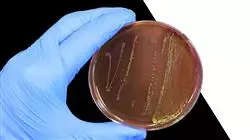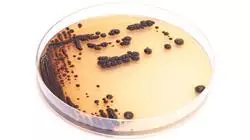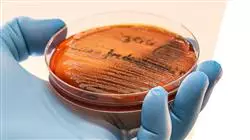University certificate
The world's largest faculty of nursing”
Why study at TECH?
Thanks to this 100% onlinePostgraduate diploma, you will use the most advanced Molecular Diagnostic techniques for the rapid and accurate identification of Multidrug-Resistant Bacteria”

A new study by the World Health Organization estimates that more than 20,000 people die each year from infections that do not respond to antibiotics. Faced with this scenario, the organization urges nurses to implement strict control measures to prevent the spread of Multidrug-Resistant Bacteria and to advocate for the rational use of antibiotics. Only in this way will professionals be able to provide comprehensive care to their patients, while carrying out strategies to prevent the spread of bacteria in clinical care settings.
In this framework, TECHlaunches a revolutionary Postgraduate diploma in Clinical and Molecular Management of Infections Caused by Multidrug-Resistant Bacteria for Nursing. The academic itinerary will delve into the mechanisms of intrinsic resistance to antibiotics, which will allow nurses to adjust treatments in a timely manner. In this line, the syllabus will provide the keys to perform an optimal management of patients with infections in Intensive Care Units. Therefore, graduates will optimize the use of antibiotics and prevent the selection of multiresistant bacteria. On the other hand, the program will delve into Proteomics in Clinical Microbiology, enabling professionals to evaluate the efficacy of treatments and detect changes in resistance.
In addition, the university program is delivered in a convenient 100% online format. This will make it possible for nurses to combine their studies with the rest of their daily obligations, since the schedules and evaluation timetables can be planned individually. At the same time, they will only need a device with Internet access to access the Virtual Campus and have access to high quality contents. Likewise, in this digital environment they will find a library full of multimedia resources, such as infographics or interactive summaries, which will strengthen their skills in a dynamic way.
You will be able to download the entire syllabus from the first day of the course, being able to study it comfortably from your smartphone or tablet of choice”
This Postgraduate diploma in Clinical and Molecular Management of Infections Caused by Multidrug-Resistant Bacteria for Nursing contains the most complete and updated scientific program on the market. Its most notable features are:
- The development of practical cases presented by experts in Microbiology, Medicine and Parasitology
- The graphic, schematic and eminently practical contents with which it is conceived gather scientific and practical information on those disciplines that are indispensable for professional practice
- Practical exercises where self-assessment can be used to improve learning.
- Its special emphasis on innovative methodologies
- Theoretical lessons, questions to the expert, debate forums on controversial topics, and individual reflection assignments
- Content that is accessible from any fixed or portable device with an Internet connection
You will deepen your understanding of the Bioinformatics Tools for Genomics and improve your understanding of Human Health”
The program’s teaching staff includes professionals from the field who contribute their work experience to this educational program, as well as renowned specialists from leading societies and prestigious universities.
The multimedia content, developed with the latest educational technology, will provide the professional with situated and contextual learning, i.e., a simulated environment that will provide immersive education programmed to learn in real situations.
This program is designed around Problem-Based Learning, whereby the professional must try to solve the different professional practice situations that arise during the course. For this purpose, students will be assisted by an innovative interactive video system created by renowned and experienced experts.
Are you looking to incorporate into your practice the most innovative strategies to prevent Multidrug-Resistant Bacteria infections in the ICU? Get it with this program in only 540 hours”

TECHrevolutionary Relearning system will allow you to update your knowledge at your own pace, without depending on external teaching constraints”
Syllabus
This Postgraduate diploma will provide nurses with a detailed understanding of the mechanisms of antimicrobial resistance in bacteria. The syllabus will address the different multidrug-resistant human pathogens (including Staphylococcus aureus), which will enable professionals to rapidly identify infections. At the same time, the syllabus will also include the management of patients with infections caused by Multiresistant Bacteria in Intensive Care Units. Therefore, graduates will be able to perform continuous monitoring of these individuals to detect early signs of infection and adjust treatments as needed.

You will manage the most effective nosocomial infection control strategies to reduce the transmission of Multidrug-Resistant Bacteria in clinical settings”
Module 1. Multidrug-Resistant Bacteria in Human Pathology
1.1. Mechanisms of Acquired Resistance to Antibiotics
1.1.1. Acquisition of Resistance Genes
1.1.2. Mutations
1.1.3. Acquisition of Plasmids
1.2. Mechanisms of Intrinsic Resistance to Antibiotics
1.2.1. Blockage of Antibiotic Entry
1.2.2. Modification of the Antibiotic Target
1.2.3. Inactivation of the Antibiotic
1.2.4. Antibiotic Expulsion
1.3. Chronology and Evolution of Antibiotic Resistance
1.3.1. Discovery of Antibiotic Resistance
1.3.2. Plasmids
1.3.3. Evolution of Resistance
1.3.4. Current Trends in the Evolution of Antibiotic Resistance
1.4. Antibiotic Resistance in Human Pathology
1.4.1. Increased Mortality and Morbidity
1.4.2. Impact of Resistance on Public Health
1.4.3. Economic Cost Associated with Antibiotic Resistance
1.5. Multidrug-Resistant Human Pathogens
1.5.1. Acinetobacter Baumannii
1.5.2. Pseudomonas Aeruginosa
1.5.3. Enterobacteriaceae
1.5.4. Enterococcus Faecium
1.5.5. Staphylococcus Aureus
1.5.6. Helicobacter Pylori
1.5.7. Campylobacter Spp
1.5.8. Salmonellae
1.5.9. Neisseria Gonorrhoeae
1.5.10. Streptococcus Pneumoniae
1.5.11. Hemophilus Influenzae
1.5.12. Shigella Spp
1.6. Bacteria Highly Dangerous to Human Health: Update of the WHO List
1.6.1. Critical Priority Pathogens
1.6.2. High Priority Pathogens
1.6.3. Pathogens with Medium Priority
1.7. Analysis of the Causes of Antibiotic Resistance
1.7.1. Lack of New Antibiotics
1.7.2. Socioeconomic Factors and Health Policies
1.7.3. Poor Hygiene and Sanitation
1.7.4. Health Policies and Antibiotic Resistance
1.7.5. International Travel and Global Trade
1.7.6. Dispersal of High-Risk Clones
1.7.7. Emerging Pathogens with Resistance to Multiple Antibiotics
1.8. Antibiotic Use and Abuse in the Community
1.8.1. Prescription
1.8.2. Acquisition
1.8.3. Misuse of Antibiotics
1.9. Current Status of Antibiotic Resistance in the World
1.9.1. Global Statistics
1.9.2. Central and South America
1.9.3. Africa
1.9.4. Europe
1.9.5. North America
1.9.6. Asia and Oceania
1.10. Perspectives on Antibiotic Resistance
1.10.1. Strategies to Mitigate the Problem of Multidrug-Resistance
1.10.2. International Actions
1.10.3. Actions at the Global Level
Module 2. Management of Patients with Multidrug-Resistant Bacterial Infections in Intensive Care Units (ICU)
2.1. Colonization and Infection of Patients in ICUs
2.1.1. Types of ICUs
2.1.2. Epidemiology
2.1.3. Risk Factors Associated with Infection in ICUs
2.2. Impact of Nosocomial Infections in the Critically Ill Patient
2.2.1. Importance of Nosocomial Infections in ICUs
2.2.2. Risk Factors for Nosocomial Infections
2.2.2.1. Patient Factors
2.2.2.2. Factors of the ICU Environment
2.2.2.3. Factors Related to the Healthcare Personnel
2.2.3. Impact of Nosocomial Infections in Immunocompromised Patients
2.2.4. Impact on Length of Stay in the ICU
2.3. Pneumonia Associated with Mechanical Ventilation
2.3.1. Etiology
2.3.2. Diagnosis
2.3.3. Treatment
2.4. Urinary Tract Infections Associated with Catheters
2.4.1. Etiology
2.4.2. Diagnosis
2.4.3. Treatment
2.5. Primary Bacteremias and Catheter-Related Bacteremias
2.5.1. Etiology
2.5.2. Diagnosis
2.5.3. Treatment
2.6. Pseudomembranous Colitis
2.6.1. Etiology
2.6.2. Diagnosis
2.6.3. Treatment
2.7. Infections by Opportunistic Pathogens
2.7.1. Etiology
2.7.2. Diagnosis
2.7.3. Treatment
2.8. Appropriate Use of Antibiotics
2.8.1. Programs for the Optimization of Antibiotic use (PROA) in the ICU
2.8.2. Antibiotic Therapy Strategies for the Treatment of Gram-Negative Patients
2.8.3. Antibiotic Therapy Strategies for the Treatment of Gram-Positive Patients
2.8.4. Antibiotic Therapy Strategies for the Treatment of Co-Infections
2.9. Strategies for the Prevention of BMR Infections in the ICU
2.9.1. Hygiene Measures
2.9.2. Infection Control Measures
2.9.3. Protocols and Clinical Practice Guidelines
2.9.4. Education and Training of ICU Personnel
2.9.5. Participation of Patients and their Families
2.10. Infection Prevention Strategies in the ICU
2.10.1. Infection Prevention Strategies in the ICU According to the Focus
2.10.1.1. Pneumonia
2.10.1.2. Bacteremia
2.10.1.3. Urinary Infection
2.10.2. Evaluation and Quality Indicators in the Prevention of Infections
2.10.3. Evaluation and Continuous Improvement Tools
2.10.4. Successful Examples of Infection Prevention in ICUs
Module 3. Proteomics in Clinical Microbiology
3.1. Proteomics in the Microbiology Laboratory
3.1.1. Evolution and Development of Proteomics
3.1.2. Importance in Microbiological Diagnosis
3.1.3. Proteomics of Multi-Resistant Bacteria
3.2. Qualitative Protein Separation Techniques
3.2.1. Two-Dimensional Electrophoresis (2DE)
3.2.2. DIGE Technology
3.2.3. Applications in Microbiology
3.3. Quantitative Protein Separation Techniques
3.3.1. Isotopic Labelling
3.3.2. High Performance Liquid Chromatography (HPLC)
3.3.3. Mass Spectrometry (MS)
3.3.3.1. MALDI-TOF Technologies in the Clinical Microbiology Laboratory
3.3.3.1.1. VITEK®MS System
3.3.3.1.2. MALDI Biotyper® System
3.4. MALDI-TOF Applications in Clinical Microbiology
3.4.1. Identification of Microorganisms
3.4.2. Characterization of Antibiotic Resistance
3.4.3. Bacterial Typing
3.5. Bioinformatics Tools for Proteomics
3.5.1. Proteomic Databases
3.5.2. Protein Sequence Analysis Tools
3.5.3. Visualization of Proteomic Data
3.6. Genomics in the Microbiology Laboratory
3.6.1. Evolution and Development of Genomics
3.6.2. Importance in Microbiological Diagnosis
3.6.3. Genomics of Multi-Resistant Bacteria
3.7. Types of Sequencing
3.7.1. Sequencing of Genes with Taxonomic Value
3.7.2. Sequencing of Genes of Taxonomic Value
3.7.3. Massive Sequencing
3.8. Applications of Massive Sequencing in Clinical Microbiology
3.8.1. Whole Bacterial Genome Sequencing
3.8.2. Comparative Genomics
3.8.3. Epidemiological Surveillance
3.8.4. Microbial Diversity and Evolution Studies
3.9. Bioinformatics Tools for Genomics
3.9.1. Genomic Databases
3.9.2. Sequence Analysis Tools
3.9.3. Visualization of Genomic Data
3.10. Future of Genomics and Proteomics in the Clinical Laboratory
3.10.1. Recent and Future Developments in Genomics and Proteomics
3.10.2. Development of New Therapeutic Strategies
3.10.3. Technical and Bioinformatics Challenges
3.10.4. Ethical and Regulatory Implications

You will have at your disposal the most modern educational resources, with free access to the virtual classroom 24 hours a day. Enroll now!”
Postgraduate Diploma in Clinical and Molecular Management of Infections Caused by Multidrug-Resistant Bacteria for Nursing
If you are a nurse and want to acquire advanced knowledge in the diagnosis, treatment and prevention of infections caused by bacteria resistant to multiple antibiotics, you have come to the right place. At TECH Global University you will find an innovative university diploma that will help you fulfill your academic goals. This program, delivered 100% online, provides in-depth understanding and practical skills essential to address one of the most critical challenges in healthcare today. During the course, you will explore the fundamentals of bacterial resistance, including the molecular mechanisms underlying antimicrobial resistance, as well as clinical strategies for effective management of these infections. Here, key topics such as identification and characterization of multidrug-resistant bacteria, rational use of antimicrobials, and implementation of infection control measures in different healthcare settings will be addressed. An outstanding feature of this program is its practical and up-to-date scientific evidence-based approach. You will have the opportunity to analyze case studies, allowing you to develop critical skills in clinical decision making, designing personalized treatments, and educating patients or colleagues on infection prevention and control practices.
Get a Postgraduate Diploma in Clinical and Molecular Management of Infections caused by Multidrug-Resistant Bacteria for Nursing
The online mode of the course offers flexibility and accessibility, allowing you to access the content from any location and at times that suit your work and personal commitments. Through an advanced educational platform, you will benefit from interactive resources and up-to-date study materials that will significantly enrich your learning experience. The course is led by a team of professionals with extensive experience in the clinical and molecular management of infections caused by multidrug-resistant bacteria, who provide expert guidance and ongoing support throughout the program. Their clinical experience and up-to-date knowledge ensure that you receive high-quality education relevant to the current demands in the nursing field. Enrolling in this Postgraduate Diploma is a strategic decision for nurses who want to specialize in the management of complex infections and improve the quality of care in their work settings. This advanced specialization provides the tools necessary to effectively address the challenge of multidrug-resistant bacteria, thereby contributing to patient safety and public health.







